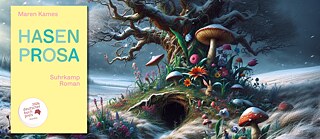In her third book, nominated for the German Book Prize 2024, Maren Kames eloquently guides her audience into the proverbial “rabbit hole” of her mind and tells her family story along the way.
Following the poetry volumes Halb Taube Halb Pfau (2016) and Luna Luna (2019), Hasenprosa (Hare prose) is the third book published by Berlin author Maren Kames. It is also her debut novel, which made it straight onto the longlist (and subsequently on the shortlist as well) for the German Book Prize 2024.The result is an (almost) linear narrative, a beautiful, sometimes experimental text made up of shorter and longer word cascades and creations, quotations, quirky dialogs and fine poetry that Maren Kames doesn't quite want to leave behind. Always present: a hare named Salomon.I am your worldly-wise journeyman!, cried the hare from high above the meadow, we have the hare days, the weather is fair weather, and we tell of wonderful secret and open things, of nature, the course of the world and the state of the land in the hare's walk, my name is Salomon, my surname Mumm, I have foresight and daring, follow me!
Respectfully told family history
The fact that the first-person narrator's name is not just Maren by chance, but that this is a largely autobiographical work, is hinted at from time to time. This becomes clear at the latest when the publication of the book is discussed and located in the present: “I thought that the year of the hare would already be over when the book was to begin to exist on the outside (...)”, although she cannot resist creating confusion again: “The time puzzles, cross words, coriander stem and rose of hay, hay, hay, my grandfather's hands, my grandmother's pants, where the dead go, whether peace is a place.”Hasenprosa (Hare Prose) is an unusual, lovingly and respectfully told family story, whose members are sensitively observed and artfully described, but also taken seriously. The hare that accompanies the narrator and lends the book its title helps her to explore her world of thoughts, but also disturbs her with chaotic interjections and anarchistic behavior. It is the kind of character that book clubs will try - in vain - to get hold of, although it is possible that it is simply pure (but not harmless!) fun after all, another slant in the convolutions of the narrator's brain, which, if it were a house, one would have to imagine as the most beautiful Hundertwasser palace. The hare would then perhaps be a crooked gable:
(...)I'm asking you now, because someone needs to ask you this to get you out of your Misery-seat (shaft chamber, crying circle in the world): What are your fundamental stars? Who in heaven are your sinking idols? Here is the sky. Who do you see there?
Melancholy and tenderness
As in her poetry collections, the author shares a variety of pop music quotes, but also photos (including of her grandfather Erich and the author, and her fallen cactus), stills from music videos (see below) and drawings, almost surprisingly with more or less direct reference to the text. It is difficult to select suitable, representative quotations, so original is the progression of the text, so multi-layered is its composition. Above all this hovers the grande dame of German poetry, Friederike Mayröcker, who is quoted several times and was undoubtedly a important influence on the author. The book even includes sound: the accompanying playlists (the “Manifeste” and the “Sukkutane” soundtrack) round off the experience. In addition to all this, and little anecdotes about Billy Eilish, Hellfire Rockets, W.G.Sebald, Prince, John Irving or the embryogenesis of multicellular animals, the passages dealing with family are particularly noteworthy. All these passages are testimony to what is often lost in the book's daring literary capers, namely what a great and captivating storyteller Maren Kames is. She is also not afraid to combine passages of absurdity with those full of melancholy and tenderness.Hasenprosa reads quickly, amusingly and manages to surprise on every page. The nomination for the German Book Prize is further proof that even the mainstream of the German literary landscape is good for positive surprises. Hasenprosa reads fluidly, amusingly and manages to surprise on every page. And its inclusion on the shortlist for the 2024 Book Prize was almost a matter of course given the stylistic independence, literary ingenuity and artistic power of this novel debut. It would have been a worthy winner!
Maren Kames: Hasenprosa. Novel
Berlin: Suhrkamp, 2024. 182 p.
ISBN: 978-3-518-43168-9
You can find this title in our eLibrary Onleihe
Related Links
September 2024
